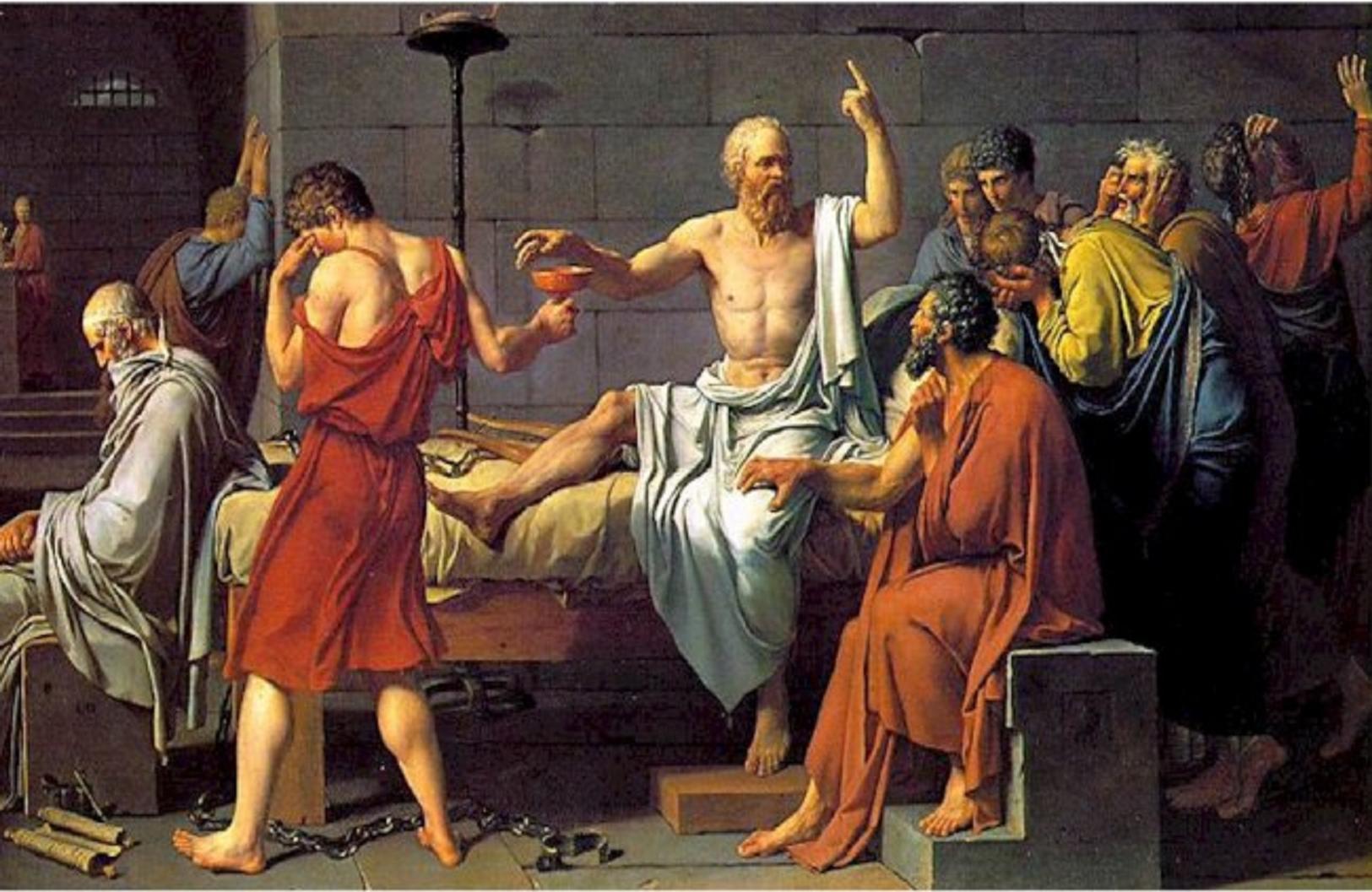Summary of Plato’s Phaedo

In the Phaedo, Socrates defends the immortality of the soul and gives an account of the purpose of the philosophical life. The book follows the pattern of an epic poet and resembles an entrance and a return. We can divide the text into parts:
The Theseus Myth (57a)
Socrates is not concerned about pleasure and pain while waiting for his death, signaled by docking of ship.
Many people want to hear from Phaedo the story of how Socrates died. Phaedo tells them that Socrates was not kill because the ship of Theseus was out of port. On the day of its return, they came early to meet Socrates who, when freed from his shackles, remarks about how pleasure and pain are in him and that a discussion of suicide ensues – we should not committ suicide because it is cowardly and offensive to the gods, since we are their possessions.
Socrates’ Speech (63b) – Hot and Cold Shackles
Socrates states separation from heats and colds of the body is best – death..
Socrates explains that true philosophers should not fear death, since true life is not in the body but in the soul. The body prevents and distracts us from seeing true forms, and so we should not fear but rather welcome its passing.
Cebes’ Wonder (69e) – Firepit Smoke
Cebes doubts afterlife stronger than smoke.
Cebes then doubts this, and, not wanting to disappoint Socrates on the day of his death, hesitatingly states that most people think life is like the smoke in a fire. The soul disappears with the wind after death. He asks for Socrates to prove his claim.
Argument from Opposites (70b) – Salt, Pepper, and Frog
The peppery dead come from the salty living (afterlife).
Socrates says that tradition says there is an afterlife, but goes further and gives an argument that the soul lives after death.
- Since all opposites are generated from opposites,
- and since the living come from the dead (we are reincarnated)
- then the dead are generated from the living.
Cebes recognizes that recollection/reincarnation is not proven. Asks for reminder.
Questions:
- Are both premises incorrect, or only the second? How many qualifications are needed for the first to be correct?
Argument from Recollection ( ) – Three Cards
We remember cards before birth.
Socrates argues that all learning is ‘a remembering’.
- Since we know about perfect forms in the imperfect things we experience
- and since our senses can’t reveal that to us because they only observe what is changing
- Then the knowledge of these perfect forms must preexist in our souls before birth.
Regardless, Cebes points out that we only proved that the soul preexists, not that it exists after death.
Questions:
- Why must the acquisition of knowledge be before birth and not at birth?
Argument from Affinity (78b) – Diamond, Divine Scepter, and Mummy
The soul is more like the uncomposed/unchanging.
Socrates makes three arguments.
Permanence – diamond – the first argument (78b):
- Since what is composed of parts is the most changing and least lasting (material of tree), and what is uncomposed/simple is the longest lasting (treeness/absolute essences)
- and since the body is most changing and visible, and the soul (me or you) is simple and invisible
- Then the body drags the soul into what changes while the soul wants to stay in the eternal and unchanging (ultimately communion with Gods and wisdom)
Divineness – divine scepter – the second argument (80a):
- Since the body is visible and changing while the soul is invisible and unchanging
- and since what rules and is able to control others invisibly is more like the divine and what is ruled and visibly controlled is mundane
- Then the soul is most like divine and body most like the mundane.
Lastingness – mummy – the third argument (80c):
- Since the body lasts even after its death, sometimes a very long time when mummified
- and since the soul is less indissoluble and changing than it
- Then how much more will the soul last after death than the body?
Summary of Arguments
- Since the soul knows forms which are eternal, whereas the senses know material things that pass away
- and since each of these faculties is like the thing it knows (senses are material, soul is invisible)
- Then the senses pass away (it is like a material form), and the soul doesn’t pass away (it is like in an invisible form)
The Reincarnation Myth ( ) – Scooby Doo
Pure souls stay with the forms/gods, impure come back maybe as a dog like Scooby until purified
- If the soul has been freed from bodily influnece, then it is likely to remain with what is lasting.
- If the soul is polluted with bodily influence, then it is likely to be reincarnated to the world into the type of creature is resembles.
Simmias’ Counter-argument (85c) – Harp chord
The body is like a lyre and soul is the harmony
- The soul is an invisible harmony like the divine, and the body is lyre of physical components
- If the lyre’s strings are broken, the harmony disappears before the lyre.
- Therefore if the body is like a lyre (bcs its a mixture of bodily elements), then the soul predeceses the body and came into it after the lyre.
Cebes’ Counter-argument (86c) – Mummy Playing harp
The soul need not survive death of all its bodies
- The soul is like a weaver and the body is the cloak, made of physical components. He wears many in a lifetime.
- But the weaver doesn’t outlast the last cloak he wove (he dies in it)
- Therefore the soul survives the death of some bodies. That doesn’t mean he’ll survive death of all bodies.
Socrates Reply to Simmias (88-misology/91c-reply) –
Be Consistent Simmias!
Socrates makes three arguments:
Either soul is a harmony or it isn’t. (91e) – On/off Car radio
- If you agree that the soul is a harmony composite of string and sound
- If harmonies can’t preexist their components
- Then either the soul is not a harmony (bcs it can’t preexist body – which he already agreed to) or the soul is a harmony (because learning does preexist the body).
Every soul, then, must be equal in goodness. (92e) – Lyre and Speakeres
- If you agree that the soul is a harmony composite of string and sound
- and if there are good and bad souls
- Then either the soul is not always a harmony, or the soul is n
The soul is not a harmony. (94b) – Steering Wheel
- The soul rules the body and can oppose it.
- A harmony cannot oppose its elements
- Therefore a soul is not a harmony.
Socrates Wonder (95a)
The theory of forms came about from his dissatisfaction with Democritus and Anaxagorus and then recognizing the common sense of teloeology.
Preparing to answer Cebes, he recounts his young interest in generation and corruption of Democritus and Empedocles, subsequent confusion about how 1 thing + another thing really can = 2, excitement that Anaxagorus intelligence telling how things should best exist as an answer, and further disappointment that Anaxagorus answers were material, not formal or teleological.
Socrates Reply to Cebes




